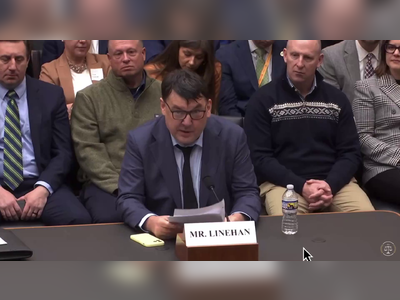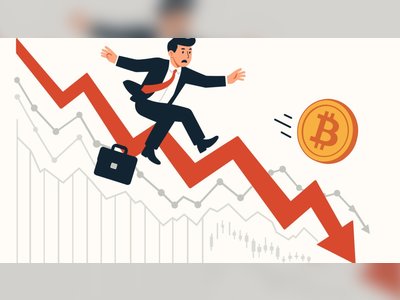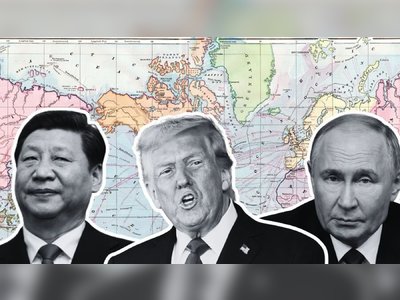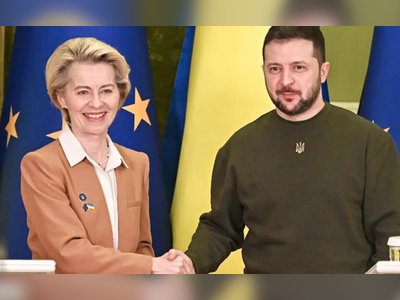Tensions Escalate Within German Government Over Ukraine Aid
Disagreements arise between Chancellor Olaf Scholz and Foreign Minister Annalena Baerbock as election approaches.
Within the outgoing German government, tensions have surfaced as Foreign Minister Annalena Baerbock criticized the administration's indecision regarding aid to Ukraine.
This highlights the growing discord among political factions ahead of upcoming elections.
In an interview with Politico, Baerbock expressed frustration that some politicians are prioritizing electoral gains over ensuring peace and freedom in Europe.
Chancellor Olaf Scholz, from the Social Democratic Party (SPD), has initiated a debate by linking new aid to Ukraine with easing fiscal restrictions within Germany.
Scholz stated in a television interview that a proposed €3 billion aid package, supported by Baerbock and other German leaders, would require new borrowing, a move he does not endorse.
Baerbock has raised concerns over Germany's hesitant stance on Ukrainian aid, which she argues could undermine trust among European allies.
She emphasized the importance of maintaining this trust, especially in light of alleged Russian sabotage of undersea cables in the Baltic Sea.
The Foreign Minister further criticized past German administrations, particularly the Christian Democratic Union (CDU) under former Chancellor Angela Merkel and the SPD, for their involvement in the Nord Stream 2 pipeline project with Russia.
Baerbock contends that the pipeline's construction was politically motivated.
Baerbock also emphasized the need for Germany to invest more than 2% of its GDP in defense.
She expressed willingness to collaborate with the newly elected U.S. administration, underscoring the importance of the transatlantic partnership.
Media reports detail a government meeting where Baerbock, dissatisfied with Scholz's stance on Ukraine, demonstratively left a session after the Chancellor refused a new aid package.
Scholz's hesitance over the aid, reportedly backed by Baerbock and Defense Minister Boris Pistorius, comes before the Bundestag elections scheduled for February 23.
Experts from the Bundeswehr had prepared a list of military supplies intended for Ukraine, including three more IRIS-T air defense systems and various munitions.
However, Scholz insists that new aid can only occur if borrowing limits are lifted, creating a standoff within the government.
As German media note, the atmosphere within the government is tense, with deep divisions apparent over the approach to supporting Ukraine.
This highlights the growing discord among political factions ahead of upcoming elections.
In an interview with Politico, Baerbock expressed frustration that some politicians are prioritizing electoral gains over ensuring peace and freedom in Europe.
Chancellor Olaf Scholz, from the Social Democratic Party (SPD), has initiated a debate by linking new aid to Ukraine with easing fiscal restrictions within Germany.
Scholz stated in a television interview that a proposed €3 billion aid package, supported by Baerbock and other German leaders, would require new borrowing, a move he does not endorse.
Baerbock has raised concerns over Germany's hesitant stance on Ukrainian aid, which she argues could undermine trust among European allies.
She emphasized the importance of maintaining this trust, especially in light of alleged Russian sabotage of undersea cables in the Baltic Sea.
The Foreign Minister further criticized past German administrations, particularly the Christian Democratic Union (CDU) under former Chancellor Angela Merkel and the SPD, for their involvement in the Nord Stream 2 pipeline project with Russia.
Baerbock contends that the pipeline's construction was politically motivated.
Baerbock also emphasized the need for Germany to invest more than 2% of its GDP in defense.
She expressed willingness to collaborate with the newly elected U.S. administration, underscoring the importance of the transatlantic partnership.
Media reports detail a government meeting where Baerbock, dissatisfied with Scholz's stance on Ukraine, demonstratively left a session after the Chancellor refused a new aid package.
Scholz's hesitance over the aid, reportedly backed by Baerbock and Defense Minister Boris Pistorius, comes before the Bundestag elections scheduled for February 23.
Experts from the Bundeswehr had prepared a list of military supplies intended for Ukraine, including three more IRIS-T air defense systems and various munitions.
However, Scholz insists that new aid can only occur if borrowing limits are lifted, creating a standoff within the government.
As German media note, the atmosphere within the government is tense, with deep divisions apparent over the approach to supporting Ukraine.
AI Disclaimer: An advanced artificial intelligence (AI) system generated the content of this page on its own. This innovative technology conducts extensive research from a variety of reliable sources, performs rigorous fact-checking and verification, cleans up and balances biased or manipulated content, and presents a minimal factual summary that is just enough yet essential for you to function as an informed and educated citizen. Please keep in mind, however, that this system is an evolving technology, and as a result, the article may contain accidental inaccuracies or errors. We urge you to help us improve our site by reporting any inaccuracies you find using the "Contact Us" link at the bottom of this page. Your helpful feedback helps us improve our system and deliver more precise content. When you find an article of interest here, please look for the full and extensive coverage of this topic in traditional news sources, as they are written by professional journalists that we try to support, not replace. We appreciate your understanding and assistance.











